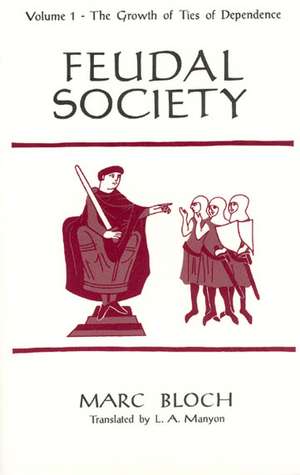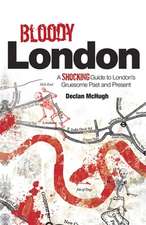Feudal Society, Volume 1
Autor Marc Blochen Limba Engleză Paperback – 31 iul 1964
"Few have set themselves to the formidable task of reconstructing and analyzing a whole human environment; fewer still have succeeded. Bloch dared to do this and was successful; therein lies the enduring achievement of Feudal Society."—Charles Garside, Yale Review
Preț: 264.93 lei
Nou
Puncte Express: 397
Preț estimativ în valută:
50.70€ • 52.38$ • 42.20£
50.70€ • 52.38$ • 42.20£
Carte tipărită la comandă
Livrare economică 25 martie-08 aprilie
Preluare comenzi: 021 569.72.76
Specificații
ISBN-13: 9780226059785
ISBN-10: 0226059782
Pagini: 287
Ilustrații: illustrations
Dimensiuni: 132 x 206 x 25 mm
Greutate: 0.33 kg
Editura: University of Chicago Press
Colecția University of Chicago Press
ISBN-10: 0226059782
Pagini: 287
Ilustrații: illustrations
Dimensiuni: 132 x 206 x 25 mm
Greutate: 0.33 kg
Editura: University of Chicago Press
Colecția University of Chicago Press
Notă biografică
Marc Bloch was born at Lyons in 1886. He was for many years professor of medieval history at the University of Strasbourg before being called in 1936 to the Chair of Economic History at the Sorbonne. In 1939, he volunteered for active service; he was already fifty-three. After the fall of France in 1940, he went to the south, where he taught at the universities of Clermont Ferrand and Montpellier. When the south, too, was occupied, he joined the Resistance but was caught by the Gestapo, tortured, and finally shot in June 1944.
Cuprins
Foreword by M. M. Postan
Introduction: General Scope of the Inquiry
Volume 1 - The Growth of Ties of Dependence
Part I - The Environment: The Last Invasions
I. Moslems and Hungarians
1. Europe Invaded and Besieged
2. The Moslems
3. The Hungarian Assault
4. End of the Hungarian Invasions
II. The Northmen
1. General Character of the Scandinavian Invasions
2. From Raid to Settlement
3. The Scandinavian Settlements: England
4. The Scandinavian Settlements: France
5. The Conversion of the North
6. In Search of Causes
III. Some Consequences and Some Lessons of the Invasions
1. Disorder
2. The Human Contribution: the Evidence of Language and Names
3. The Human Contribution: the Evidence of Law and Social Structure
4. The Human Contribution: Problems of Origin
5. Lessons
Part II - The Environment: Conditions of Life and Mental Climate
IV. Material Conditions and Economic Characteristics
1. The Two Ages of Feudalism
2. The First Feudal Age: Density of Population
3. The First Feudal Age: Intercommunication
4. The First Feudal Age: Trade and Currency
5. The Economic Revolution of the Second Feudal Age
V. Modes of Feeling and Thought
1. Man's Attitude to Nature and Time
2. Expression
3. Culture and Social Classes
4. The Religious Mentality
VI. The Folk Memory
1. Historiography
2. The Epic
VII. The Intellectual Renaissance in the Second Feudal Age
1. Some Characteristics of the New Culture
2. The Growth of Self-Consciousness
VIII. The Foundations of Law
1. The Ascendancy of Custom
2. The Characteristics of Customary Law
3. The Revival of Written Laws
Part III - The Ties Between Man and Man: Kinship
IX. The Solidarity of the Kindred Group
1. The 'Friends by Blood'
2. The Vendetta
3. Economic Solidarity
X. Character and Vicissitudes of the Tie of Kinship
1. The Realities of Family Life
2. The Structure of the Family
3. Ties of Kinship and Feudalism
Part IV - The Ties between Man and Man: Vassalage and the Fief
XI. Vassal Homage
1. The Man of Another Man
2. Homage in the Feudal Era
3. The Origins of Ties of Personal Dependence
4. The Household of Warriors
5. Carolingian Vassalage
6. The Formation of the Classical Type of Vassalage
XII. The Fief
1. 'Benefit' and Fief: Stipendiary Tenement
2. The 'Housing' of Vassals
XIII. General Survey of Europe
1. French Diversity: the South-West and Normandy
2. Italy
3. Germany
4. Outside the Carolingian Empire: Anglo-Saxon England and North-Western Spain
5. The Imported Feudal Systems
XV. The Man of Several Masters
1. The Plurality of Homage
2. Heyday and Decline of Liege Homage
XVI. Vassal and Lord
1. Aid and Protection
2. Vassalage as a Substitute for the Kinship Tie
3. Reciprocity and Breach of Engagements
XVII. The Paradox of Vassalage
1. The Contradictions of the Evidence
2. Legal Ties and Human Contact
Part V - Ties of Dependence among the Lower Orders of Society
VIII. The Manor
1. The Lord's Estate
2. The Extension of the Manorial System
3. Lord and Tenants
XIX. Servitude and Freedom
1. The Starting Point: Personal Status in the Frankish Period
2. French Serfdom
3. The Case of Germany
4. England: the Vicissitudes of Villeinage
XX. Towards New Forms of Manorialsim
1. The Stabilization of Obligations
2. The Transformation of Human Relationships
Introduction: General Scope of the Inquiry
Volume 1 - The Growth of Ties of Dependence
Part I - The Environment: The Last Invasions
I. Moslems and Hungarians
1. Europe Invaded and Besieged
2. The Moslems
3. The Hungarian Assault
4. End of the Hungarian Invasions
II. The Northmen
1. General Character of the Scandinavian Invasions
2. From Raid to Settlement
3. The Scandinavian Settlements: England
4. The Scandinavian Settlements: France
5. The Conversion of the North
6. In Search of Causes
III. Some Consequences and Some Lessons of the Invasions
1. Disorder
2. The Human Contribution: the Evidence of Language and Names
3. The Human Contribution: the Evidence of Law and Social Structure
4. The Human Contribution: Problems of Origin
5. Lessons
Part II - The Environment: Conditions of Life and Mental Climate
IV. Material Conditions and Economic Characteristics
1. The Two Ages of Feudalism
2. The First Feudal Age: Density of Population
3. The First Feudal Age: Intercommunication
4. The First Feudal Age: Trade and Currency
5. The Economic Revolution of the Second Feudal Age
V. Modes of Feeling and Thought
1. Man's Attitude to Nature and Time
2. Expression
3. Culture and Social Classes
4. The Religious Mentality
VI. The Folk Memory
1. Historiography
2. The Epic
VII. The Intellectual Renaissance in the Second Feudal Age
1. Some Characteristics of the New Culture
2. The Growth of Self-Consciousness
VIII. The Foundations of Law
1. The Ascendancy of Custom
2. The Characteristics of Customary Law
3. The Revival of Written Laws
Part III - The Ties Between Man and Man: Kinship
IX. The Solidarity of the Kindred Group
1. The 'Friends by Blood'
2. The Vendetta
3. Economic Solidarity
X. Character and Vicissitudes of the Tie of Kinship
1. The Realities of Family Life
2. The Structure of the Family
3. Ties of Kinship and Feudalism
Part IV - The Ties between Man and Man: Vassalage and the Fief
XI. Vassal Homage
1. The Man of Another Man
2. Homage in the Feudal Era
3. The Origins of Ties of Personal Dependence
4. The Household of Warriors
5. Carolingian Vassalage
6. The Formation of the Classical Type of Vassalage
XII. The Fief
1. 'Benefit' and Fief: Stipendiary Tenement
2. The 'Housing' of Vassals
XIII. General Survey of Europe
1. French Diversity: the South-West and Normandy
2. Italy
3. Germany
4. Outside the Carolingian Empire: Anglo-Saxon England and North-Western Spain
5. The Imported Feudal Systems
XV. The Man of Several Masters
1. The Plurality of Homage
2. Heyday and Decline of Liege Homage
XVI. Vassal and Lord
1. Aid and Protection
2. Vassalage as a Substitute for the Kinship Tie
3. Reciprocity and Breach of Engagements
XVII. The Paradox of Vassalage
1. The Contradictions of the Evidence
2. Legal Ties and Human Contact
Part V - Ties of Dependence among the Lower Orders of Society
VIII. The Manor
1. The Lord's Estate
2. The Extension of the Manorial System
3. Lord and Tenants
XIX. Servitude and Freedom
1. The Starting Point: Personal Status in the Frankish Period
2. French Serfdom
3. The Case of Germany
4. England: the Vicissitudes of Villeinage
XX. Towards New Forms of Manorialsim
1. The Stabilization of Obligations
2. The Transformation of Human Relationships













